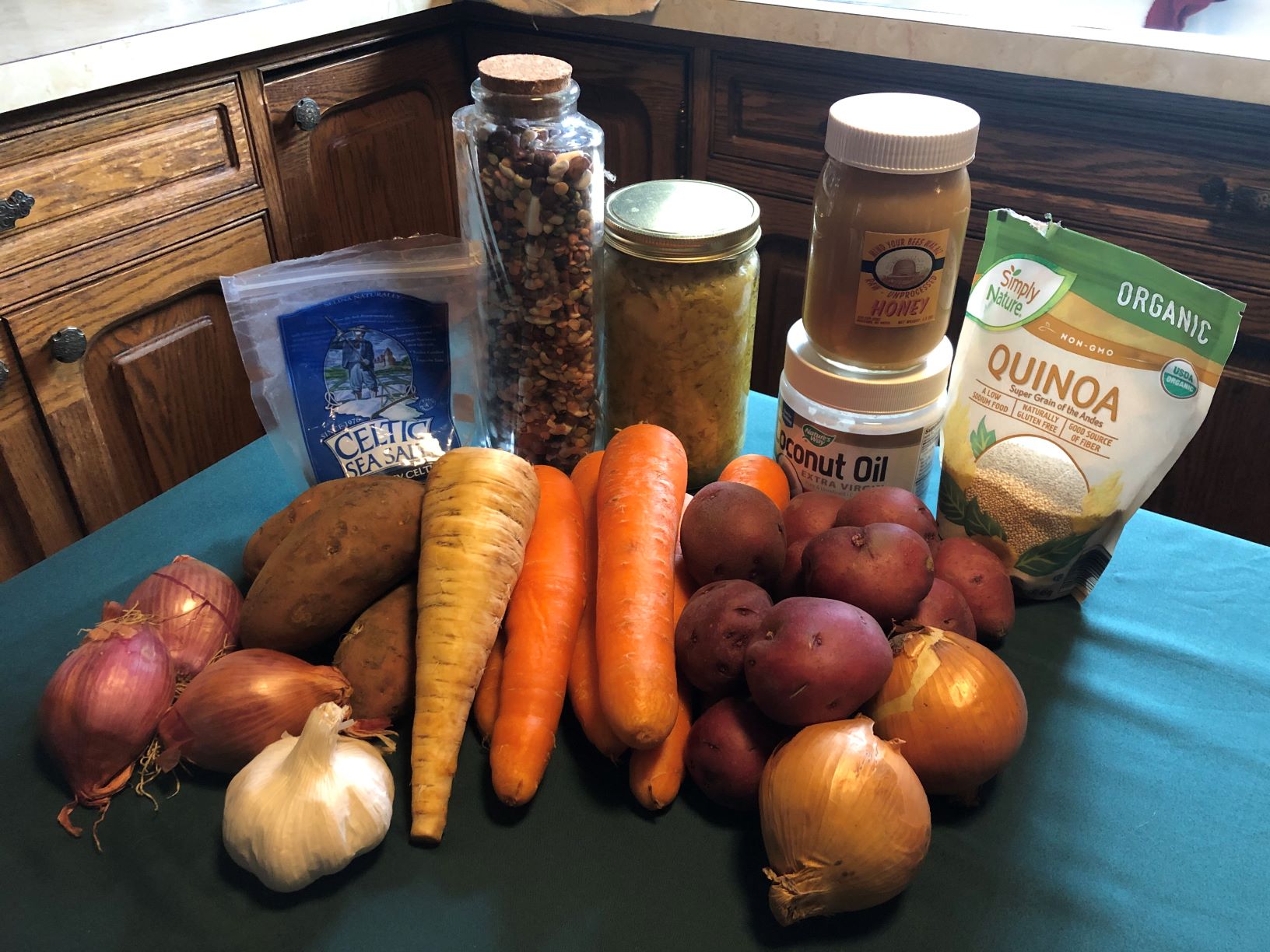
The answer – eat real food – clean food
When you walk in the grocery store there are real food products and items that we think of as food but are actually pseudo foods that are lacking in nutrient value.
These other products are highly refined (elements are taken out of food), have added synthetic vitamins (again created, not natural), preservatives (food was not meant to last forever), denatured (which changes how we can access the nutrients), containing MSG, aspartame, high fructose corn syrup, dyes, genetically engineered foods, you get it the list goes on and on. Products containing these and other items are not supporting our immune system/health.
Eat the rainbow
Vegetables – carrots, peppers, cruciferous vegetables, kale, spinach, romaine, green bean, beets, celery, onions, garlic, sweet potatoes, cucumbers, parsnips to mention a few should all be a part of your daily diet.
The more colorful your selections of veggies the greater health benefit. Variety is the key.
Choose, raw, steamed, sauteed, creamed, grilled, just eat them. If you are dealing with leaking gut or inflammation it is best to consume mostly partly cooked vegetables for easy nutrient absorption and easy digestion. Enjoy a raw salad daily. Allow your body to heal, then dive into munching on more raw veggies daily.
All vegetables have nourishing properties. Cruciferous vegetables are not always featured. These are rich in folate, vitamins C, E & K along with fiber and are low in calories. Cruciferous veggies are a good source of phytonutrients that may lower inflammation.
Cruciferous delights
- broccoli
- cauliflower
- cabbage
- Brussel sprouts
- kale
- bok choy
Fruit in the House? Yes
Enjoy some fruit, preferably organic, apples, oranges, berries, melons bananas, peaches, mango, plums, grapefruit, again eat the rainbow. We all need some sweetness in life, eat the natural thing, grab a piece of fruit.
Berries- an antioxidant powerhouse
- Wolfberries – (We love drinking Ningxia Red loaded with wolfberries and other berries, the best way to start the day)
- pomegranates
- blueberries
- raspberries
- blackberries
When it comes to cooking with fats often people think vegetable/canola/corn oils are good choices. This, however, is not the case. They are not made from vegetables but from seeds. These industrial oils we consume are the most highly processed foods. Instead, choose a healthier option.
Choose healthy fats
- coconut oil cold-pressed, unrefined
- butter
- olive oil 1st cold-pressed – preferred unheated
- Ghee
- Lard – not hydrogenated, preferred to purchase from your farmer
- Consume nuts and seeds
Did you know that our bodies need saturated fat for cellular membranes, energy, and hormone production?
A quality fat as part of our diet will leave us feeling full and ready to go. When following consuming a low-fat diet we remain hungry and have a tendency to overeat which increases our weight.
Iron & Protein-rich foods
- Grass-fed beef
- poultry
- seafood
- beans and lentils
- nuts
- eggs
There are several ways to get protein in our diet. Choose from the list, a variety is always best.
Choose whole grains
- Sourdough bread made from a culture
- Oats
- Quinoa
- Millet
- Flax
- Wild rice
- Einkorn and Spelt flour for baking
When preparing grains it is in your best interest to soak grains overnight before cooking. A great resource is “Nourishing Traditions” by Sally Fallon and Mary G. Enig, Ph, D. Grains that are not soaked overnight make it hard for our bodies to digest and can create inflammation.
Natural Sweeteners – Use sparingly
- Raw honey
- Blackstrap molasses
- Sucanat
- Date sugar
- Stevia
- Real maple syrup
Honey is our go-to natural sweetener. Did you know there is a difference between raw and pasteurized honey? Recently I read this article the Health Effects of Honey which shares valuable information on the topic.
When cooking and preparing foods use natural sweeteners sparingly. Increased consumption of sugar is linked to inflammation and long-term health problems.
Probiotics rich foods
- yogurt
- kefir
- sauerkraut
- fermented vegetable
- cultured beverages
Cultured foods and beverages are healthy. There are good and bad microorganisms in our bodies. Probiotic foods have health benefits such as improved digestive health which improves overall health. Fermented foods provide good microorganisms.
Importance of water
- Drink half your weight in ounces of water per day
- Flush body waste
- Hydrates
Are you drinking enough water? Hydration plays a major role in proper brain function, that in itself should be enough reason to increase your consumption. Other benefits: helps energy levels, improves digestion helps with skin health. Choose clean water such as filtered, spring, or reverse osmosis water.
Get back to basics, cook at home.
